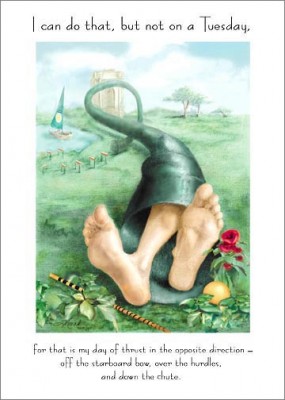Oliver Twist
The very least you need to know about Oliver Twist for when you want to sound like you know lots of other things is that it’s the one about the pickpockets. (“Oh yes, that’s the one about the pickpockets.”) Beyond that some of the characters are among the most famous in Dickens: Fagin, a creepy old miser who nevertheless strikes me as a sad character, keeps a ragged little gang of orphans whom he has taught to rob the rich of London. The Artful Dodger, his star pupil, recruits Oliver, who has run away from his employment as a “mute,” a pathetic-looking person who trails along behind the coffin in a burial procession to encourage weeping, gnashing of teeth, and more business for the undertaker. Finally, there’s Bill Sykes, one of literature’s most famous sociopaths, his bull terrier, and Nancy, the prostitute who loves Bill and whom he murders.
Oliver began life as an “item of mortality” in a workhouse under the supervision of a beadle (a minor parish official) named Mr. Bumble. Dickens is relentless detailing how Oliver, is “cuffed and buffeted through the world—despised by all and pitied by none,” and left at the workhouse where “twenty or thirty other juvenile offender against the poor laws, rolled about the floor all day, without the inconvenience of too much food or too much clothing. . .”
His original readers couldn’t get enough of the descriptions of workhouse abuse and filthy slums much like those who can’t wait for another episode of Breaking Bad. It doesn’t really matter what century or decade, it’s all the same phenomenon. More than the just the sensationalism, it’s about being told a story. Oliver Twist is one of Dickens’ early novels and the first one to be carefully planned and plotted before it came out in monthly serialized episodes.
Reading Oliver Twist this time, I skipped over the details of beatings and of the sadism. I’m not sure how I ever got through it when I read in junior high school. The musical Oliver! had just been launched and that must have helped me with the plot and the setting. But all those happy homeless children, chimney sweeps, and wretched poor dancing through the London slums to upbeat, choreographed music frothed over the darkness and the pain in the novel. The movie was like a Disneyworld’s Adventure in Seven Dials.
Here’s a quotation from Chapter XVII: “It is the custom on the stage: in all good, murderous melodramas: to present the tragic and the comic scenes, in as regular alteration, as the layers of red and white in a side of streaky, well-cured bacon.”
It seemed to me there was precious little comedy in Oliver Twist. Mr. Bumble is sometimes funny, the Artful Dodger is entertaining, and there’s a fellow who is always threatening to eat his head. But there’s also streaky bacon in the alteration of goodness with evil. Oliver is rescued from Fagin’s gang by benevolent old Mr. Brownlow. Just when it looks as though all will be well, but since you’re not a third of the way through the book, you know it won’t be, Oliver is re-kidnapped by Nancy and Bill Sykes who are associates of Fagin. Nancy develops a soft spot for Oliver. She protects him from Bill and lays plans to help him escape.
Meantime Bill takes Oliver on a housebreaking expedition in south London. Their raid on the Maylie home fails and Bill gets away but Oliver is shot by the butler. (“The two women-servants ran upstairs to carry the intelligence that Mr. Giles had captured a robber; and the tinker busied himself in endeavouring to restore Oliver, lest he should die before he could be hanged.” Chapter XXVIII) Instead of twisting in the wind—now halfway through the story—Oliver is taken into the Maylie home, nursed back to health, and befriended by the (adopted)daughter, Rose.
The bacon tacks back. Fagin re-kidnaps Oliver yet again. A shadowy figure named Monk who turns out to be Oliver’s half-brother lays the infrastructure to diddle Oliver out of any –heretofore unsuspected–family money and connections. Nancy visits Rose and makes arrangements to restore Oliver to the Maylie’s. Bill Sykes gets wind of Nancy’s scheme. In a dark, horrendous scene, he bludgeons her to death.
By the time the story is fully cooked, we learn that Rose Maylie is Oliver’s long-lost aunt, and that Mr. Brownlow is an old friend of Oliver’s deceased father. Fagin is hanged, Bill Sykes commits suicide and the Artful Dodger is sent to a penal colony, grinning and mugging all the way.
Here are a few lines I enjoyed:
* “You shall read them. . . and you will like that, better than looking at the outsides, that is, in some cases; because there are books of which the backs and covers are by far the best parts.” Chapter XIV
* “A field-marshal has his uniform; a bishop his silk apron; a counselor his silk gown; a beadle his cocked hat. Strip the bishop of his apron, or the beadle of his hat and lace; what are they? Men. Mere men. Dignity, and even holiness too, sometimes, are more questions of coat and waistcoat than some people imagine.” Chapter XXXVII
* And the most famous quotation of them all:
“‘. . .the law supposes that your wife acts under your discretion.’
‘If the law supposes that,’ said Mr. Bumble, squeezing his hat emphatically in both hands, ‘the law is a ass—a idiot. . .’” Chapter LI
 RSS Feed
RSS Feed







